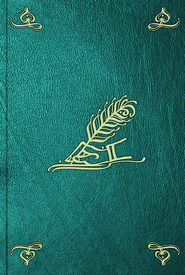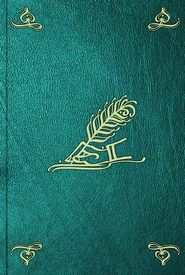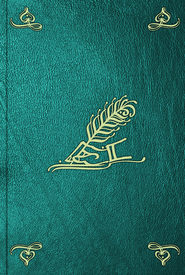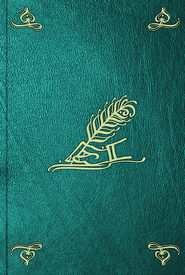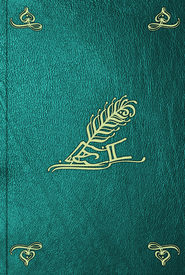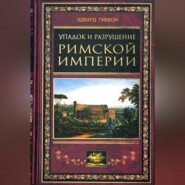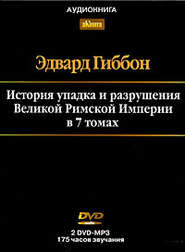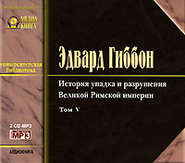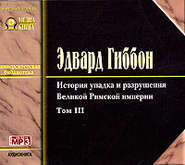По всем вопросам обращайтесь на: info@litportal.ru
(©) 2003-2025.
✖
Private Letters of Edward Gibbon (1753-1794) Volume 2 (of 2)
Настройки чтения
Размер шрифта
Высота строк
Поля
With regard to the purchase of Lee's farm I am serious, and if I am abused for my follies I must have some credit for the more rational parts of my Conduct. At least you will give me credit when I declare that in a happy winter of study and society I have not once regretted the noise of St. Stephen's and the tiresome suspense of your incomprehensible politics, but I do most sincerely regret the decreasing value of my Senatorial commodity. As soon as you can, and as much as you can, is the advice which you will follow without my having the trouble of giving it. But in the meanwhile do not let us quarrel about the disposal of the Bearskin. I am not mad, nor do I mean to settle here for life. A small part of the indefinite price of my seat was destined to embelish my habitation, and if, after enjoying the comforts three or four years, I should leave my friend's house somewhat improved, I can see nothing very extravagant in the idea.
Thus far I have written before the departure of the post, and am preparing to pass the evening at a private representation of the Barbier de Seville, which will be followed by a lively and excellent supper. Embrace My Lady. I think of her often, especially every post day. Say a kind word to Kitty, I shall soon dream that she is dead likewise. – Gosling need not be apprized of the object of the Paris draught. – The additional £1500 which I wished to retain is superfluous, as I have already observed in my last.
You are or will be astonished with some farther orders for the march of plate, linnen, books, &c., but I am of opinion that the present moment is worth enjoying, and that carriage, even double carriage, is less expensive than purchase. – You have nothing to do with Wedgewood, but I shall soon consult My lady. The spring is delightful. I often snatch a walk on Deyverdun's terrace, and visit my books, which are already deposited, but I fear the house will not be accessible before the first of May. He says I am not patient, I say he is indolent; you know that the most harmonious pairs will sometime squabble.
492.
To Lord Sheffield
Lausanne, April 31st, 1784.
Not a post has elapsed without my thinking of Sheffelina and intending her separate letter. This day which had been peremptorily fixed is now so far advanced that I have barely time to relieve my mind from some anxious English thoughts, the only ones that disturb the tranquil, chearful scenes of my well-judged retreat. – I have this moment perused the last English papers of the 20th instant, which contain by the bye your smart and as it seems successful dispute with the Minister.
Your adversaries (I fear they are the King, Lords and People) have now conquered, but at this distance I cannot discern the consequences of their victory, whether it will lead to treaty or dissolution.[90 - An address to his Majesty was presented on February 25, 1784, asking the king to take measures for the formation of such an united administration as the House of Commons had declared to be necessary. The king replied (February 27) that he did not think the dismissal of his present ministers would promote such union. A second address, asking the removal of the present ministers, was carried (March 1) by a majority of twelve, and presented March 4. The king's answer was practically a repetition of his former reply. A representation on the affairs of the nation, addressed to the king, was carried by 191 to 190 on March 8, and, with this last effort, the opposition subsided. The Mutiny Bill passed without a division on March 10, and on March 25 Parliament was dissolved.] If the latter, adieu once more to my poor seat and all my little hopes of compensation. Can nothing, nothing be done in any way by direct or indirect, by humble or strenuous measures? Upon my soul, I should consider my election dinner, £100, or 200 pounds as a tolerable conclusion of my cursed political life. But in this business perhaps you can do nothing. I therefore turn to another, which would seriously alarm me, had I less confidence in your friendship. You know (and the Goslings are apprized) that on the 20th of April M. de Lessert of Paris will draw upon them for 30,300 French Livres, and I should feel the deepest shame and affliction if his draught in my name should meet with an unfavourable reception. I am in your hands, and can say no more. Perhaps I have been too hasty, yet you cannot forget that I might reasonably act on your assurance of the Lenborough purchase money being paid before the end of February. Since that notice you have never said a word on the subject. Is the business concluded? what occasions a delay? Have any difficulties arisen? Adieu. You grow an idle correspondent. The winter has been long but not extremely rigorous. – The person who occupies Deyverdun's house is an invalid; yet I think we shall migrate before my birthday, the 8th of May.
E. G.
493.
To Lord Sheffield
Lausanne, May 11th, 1784.
DISSOLUTION OF PARLIAMENT.
*Alas! alas! alas! We may now exchange our mutual condolence, and encourage each other to support with becoming fortitude the stroke of fate. Last Christmas, on the change of administration, I was struck with the thunderbolt of the unexpected event, and in the approaching dissolution I foresaw the loss of* the little but precious stock which I had so foolishly embarked in the parliamentary bottom. *The long continuance and various changes of the tempest rendered me by degrees callous and insensible: when the art of the Mariners was exhausted, I felt that we were sinking; I expected the ship to founder; and when the fatal moment arrived, I was even pleased to be delivered from hope and fear, to the calmness of despair.
I now turn my eyes, not on the past, but on the present and the future; what is lost I try to consider as if it never had existed; and every day I congratulate my own good fortune, let me say my prudence and resolution, in migrating from your noisy stage to a scene of repose and content. But even in this separate state, I was still anxious for my friend upon English Earth, and at first was much delighted with your hint, that you were setting off for Coventry, without any prospect of an opposition. Every post, Wednesdays and Saturdays, I eagerly looked for the intelligence of your victory; and in spite of my misbehaviour, which I do not deny, I must abuse My Lady, rather than you, for leaving me in so painful a situation. Each day raised and increased my apprehension; the Courier de l'Europe first announced the contest, the English papers proclaimed your defeat, and your last letter, which I received four days ago, showed me that you exerted first the spirit, and at last the temper, of a hero. Lord B[eauchamp] behaved as I should have expected, and I am not much surprized that you should have been swept away in the general unpopularity, since even in this quiet place, your friends are considered as a factious crew, acting in direct opposition both to the King and People.[91 - Upwards of one hundred and sixty members lost their seats, and of these almost all had supported the Coalition of Fox and North. Among "Fox's Martyrs" was Lord Sheffield. Sir Sampson Gideon, afterwards Lord Eardley, and Mr. John Wilmot were elected for Coventry, the seat previously held by Lord Sheffield and Mr. Conway.]
For yourself I am at a loss what to say. If this repulse should teach you to renounce all connexion with Kings and Ministers, and patriots, and parties, and parliaments; for all of which you are by many degrees too honest; I should exclaim, with Teague,[92 - Teague is the Irish servant of Hermes Wouldbe in Farquhar's play of The Twin Rivals.] your respectable countryman, "By my Shoul, Dear Joy, you have gained a loss." Private life, whether contemplative or active, has surely more solid and independent charms; you have some domestic comforts; Sheffield is still susceptible of useful and ornamental improvements, (alas! how much better might even the last £1500 have been laid out!) and if these cares are not sufficient to occupy your leisure, I can trust your restless and enterprizing spirit to find new methods of preserving yourself from the insipidity of repose. But I much fear your discontent and regret at being excluded from that Pandæmonium which we have so often cursed, as long as you were obliged to attend it. The leaders of the party will flatter you with the opinion of their friendship and your own importance; the warmth of your temper makes you credulous and unsuspicious; and, like the rest of our species, male and female, you are not absolutely blind to your own merit, or deaf to the voice of praise. Some place will be suggested, easy, honourable, certain, where nothing is wanted but a man of character and spirit to head a superior interest; the opposition, if any, is contemptible, and the expence cannot be large. You will go down, find almost every circumstance falsely stated, repent that you had engaged yourself, but you cannot desert those friends who are firmly attached to your cause; besides, the Money you have already spent would have been thrown away; another thousand will compleat the business: deeper and deeper will you plunge, and the last evil will be worse than the first.
A FREE-SPOKEN COUNSELLOR.
You see I am a free-spoken Counsellor; may I not be a true prophet! Did I consult my own wishes, I should observe to you, that as you are no longer a Slave, you might soon be transported, as you seem to desire, to one of the Alpine hills. The purity and calmness of the air is the best calculated to allay the heat of a political feaver; the education of the two princesses might be successfully conducted under your eye and that of my Lady; and if you had resolution to determine on a residence, not a visit, at Lausanne, your worldly affairs might repose themselves after their late fatigues. But you know that I am a friend to toleration, and am always disposed to make the largest allowance for the different natures of animals; a lion and a lamb, an eagle and a Worm. I am afraid we are too quiet for you; here it would not be easy for you to create any business; you have for some time neglected books, and I doubt whether you would not think our suppers and assemblies somewhat trifling and insipid.
For myself I am happy to tell, and you will be happy to hear, that this place has in every respect exceeded my best and most sanguine hopes. How often have you said, as often as I expressed any ill-humour against the hurry, the expence, and the precarious condition of my London life, "Ay, that is a nonsensical scheme of retiring to Lausanne that you have got into your head – a pretty fancy; you remember how much you liked it in your youth, but you have now seen more of the World, and if you were to try it again, you would find yourself most woefully disappointed"? I had it in my head, in my heart; I have tryed it; I have not been disappointed; and my knowledge of the World has only served to convince me, that a Capital and a Crowd may contain much less real society, than the small circle of this gentle retirement. The winter has been longer, but, as far as I can learn, less rigorous than in the rest of Europe. The spring in all its glory is now bursting upon us, and in our garden it is displayed in all its glory. I already occupy a temporary apartment, and we live in the lower part of the house; before you receive this our lodgers will be gone and we shall be in full possession. We have much to enjoy and something to do, which I take to be the happiest condition of human life.
Now for business, the kind of subject which I always undertake with the most reluctance, and leave with the most pleasure.* I do not thank you for standing between me and Gosling, you would despise my thanks. I know your sentiments, and you are not ignorant of mine. But the step on your side was necessary: even with your security Gosling has not done the thing in a graceful way, and even the letter which informs me that he will honour M. de Lessert's draught is written with unnecessary pertness. In a post or two I shall probably hear the payment acknowledged from Paris. The Goose hopes he shall soon be reimbursed: so do I likewise, and as no difficulties can arise with regard to the title, I should imagine that before you leave town the business, that is the payment, may be finally concluded.
ENGLISH FRIENDS AT LAUSANNE.
Of the persons who already cast a Hawk's eye on the poor surplus. There is one Harris whose bond, since he calls for it, must undoubtedly be discharged, though I should be glad if you could persuade him to be contented with the interest, and trust me some time longer with the principal. I write to Whitehead, the hirer of horses, by this post, and suppose you will hear no more of him. But I must confess that Richard Way's demand of one hundred Guineas fills me with surprize and indignation, and, unless you are decidedly of a contrary opinion, I do most absolutely refuse it. Had he only been useless something might be pleaded; but if you recollect that his entire service was the recommending me to Lovegrove, it would not be easy to compute the damages (for thousands) for which I might equitably sue that Land Jobber. Though I am not very favourably disposed to the Goslings, the surplus money, when the just demands are cleared, must be left in their hands, till I can employ it, but I am serious in my hint about Lee's farm, and wish you would correspond with Hugonin in the summer; by the bye, he has not pressed my tenants this winter. A Swiss Carrier by name Pache will call in a few days to send away the boxes of plate, linnen, china, which are probably packed for foreign service. The ornamental China was never intended to be sent.
Postscript.
I cannot as yet hear anything of a certain box left at my departure in Downing-place, and repeatedly and vainly demanded; by this time I hope that it is on the road. Elmsley, to whom it was peculiarly committed, is an ingenious, an honest, but a very idle fellow. The box contains some absolute necessaries, such as paper in particular, and you are a sufferer by the delay, as you will pay a double letter for the value, or at least the size, of a single one. The stationer's paper here is so extremely thin that I turned over two leaves at once, and the error is now irreparable. Adieu.
*And now, My Lady.
Let me approach your gentle, not grimalkin, presence, with deep remorse. You have indirectly been informed of my state of mind and body; (the whole winter I have not had the slightest return of the Gout, or any other complaint whatsoever;) you have been apprized, and are now apprized, of my motions, or rather of my perfect and agreeable repose; yet I must confess (and I feel) that something of a direct and personal exchange of sentiment has been neglected on my side, though I still persuade myself that when I am settled in my new house I shall have more subject, as well as leisure to write. Such tricks of lazyness your active spirit is a stranger to, though Mrs. Frazer complains that she has never had an answer to her last letters.* That aforesaid little Donna Catharina arrived here three or four days with her sister Miss Bristow: the widow is impatient to reach England: the maiden, who is much better, proposes staying here the whole summer with her dear Doctor Tissot, and returning on the approach of Winter to pass another season at Nice. *Poor Lady Pembroke![93 - Lady Charlotte Herbert, daughter of Lady Pembroke (formerly Lady Elizabeth Spencer), was born July, 1773, and died in April, 1784.]you will feel for her; after a cruel alternative of hope and fear, her only daughter, Lady Charlotte, died at Aix at Provence; they have persuaded her to come to this place, where she is intimately connected with the Cerjat family. She has taken an agreeable house, about three miles from the town, and lives retired. But I have seen her; her behaviour is calm, but her affliction —
I accept with gratitude your friendly proposal of Wedgewood's ware, and should be glad to have it bought and packed, and sent without delay through Germany.* To you I leave the absolute and sole command, but if you have a mind to consult the Baron with regard to the ornamental, the creature is not totally devoid of taste: the number, choice, pattern, sizes, &c. you will determine, and *I shall only say, that I wish to have a very compleat service for two courses and a desert, and that our suppers are numerous, frequently fifteen or twenty persons. Adieu. I do not mean this as your letter. You are very good to poor Kitty. With you I do not condole about Coventry.*
May 11th, 1784. I wrote the first page of my letter last week.
494.
To his Stepmother
Lausanne, May 28th, 1784.
Dear Madam,
*I begin without preface or Apology, as if I had received your letter by the last post. In my own defence I know not what to say; but if I were disposed to recriminate, I might observe that you yourself are not perfectly free from the sin of laziness and procrastination. I have often wondered why we are not fonder of letter-writing: we all delight to talk of ourselves, and it is only in letters, in writing to a friend, that we can enjoy that conversation, not only without reproach or interruption, but with the highest propriety and mutual satisfaction; sure that the person whom we address feels an equal, or at least a strong and lively interest in the consideration of the pleasing subject. On the subject therefore of self I will entertain a friend, to whom none of my thoughts or actions, none of my pains or pleasures can ever be indifferent.
When I first cherished the design of retiring to Lausanne, the loss I can hardly call it of your society, but at least of your neighbourhood, and the fear of your anxiety and disapprobation have always stood before me as the most powerful objections, and I was much more apprehensive of wounding your tender attachment, than of offending Lord Sheffield's manly and vehement friendship. In the abolition of the board of trade, the motives for my retreat became more urgent and forcible; I wished to break loose, yet I delayed above a year before I could take my final resolution; and the letter in which I disclosed it to you cost me one of the most painful struggles of my life. As soon as I had conquered that difficulty, all meaner obstacles fell before me, and in a few weeks I found myself at Lausanne, astonished at my firmness and my success.
THE REIGN OF SINECURES AT AN END.
Perhaps you still blame or still lament the step which I have taken. If on your own account, I can only sympathize with your feelings, the recollection of which often costs me a sigh; If on mine, let me fairly state what I have escaped in England, and what I have found at Lausanne. Recollect the tempests of this winter, how many anxious days I should have passed, how many noisy, turbulent, hot, unwholesome nights, while my political existence, and that of my friends, was at stake; yet these feeble efforts would have been unavailing; I should have lost my seat in Parliament, and after the extraordinary expence of another Year, I must still have pursued the road of Switzerland, unless I had been tempted by some selfish Patron, or by Lord S.'s aspiring spirit, to purchase at a most inconvenient price a new seat; and once more, at the beginning of an opposition, to engage in new scenes of business. As to the immediate prospect of any thing like a quiet and profitable retreat, I should not know where to look; my friends are no longer in power. With *Pitt* and his party I have no connection; and were he disposed to favour a Man of letters, it is difficult to say what he could give, or what I would accept. The reign of pensions and sinecures is at an end, and a commission in the Excise or customs, the summet of my hopes, would give me bread at the expence of leisure and liberty. When I revolve these circumstances in my mind, my only regret, I repeat it again and again, is, that I did not embrace this salutary measure three, five, ten years ago.
Thus much I thought it necessary to say, and shall now dismiss this unpleasing part of the subject. For my situation here, health is the first consideration, and on that head your tenderness had conceived some degree of anxiety. I know not whether it has reached you that I had a fit of the Gout the day after my arrival. The deed is true, but the cause was accidental; carelessly stepping down a flight of stairs, I sprained my ancle; and my ungenerous enemy instantly took advantage of my weakness. But since my breaking that double chain, I have enjoyed a winter of the most perfect health that I have perhaps ever known, without any mixture of the little flying incommodities which in my best days have sometimes disturbed the tranquillity of my English life. You are not ignorant of Dr. Tissot's reputation, and his merit is even above his reputation. He assures me, that in his opinion, the moisture of England and Holland is most pernicious, the dry pure air of Switzerland most favourable, to a Gouty constitution: that experience justifies the Theory; and that there are fewer martyrs of that disorder in this, than in any other country in Europe.
To face p. 108, Vol. II.
HIS HOUSE, TERRACE, AND GARDEN.
This winter has every where been most uncommonly severe; and you seem in England to have had your full share of the general hardship: but in this corner, surrounded by the Alps, it has rather been long than rigorous; and its duration stole away our spring, and left us no interval between furs and silks. We now enjoy the genial influence of the Climate and the Season; and no station was ever more calculated to enjoy them than Deyverdun's house and garden, which are now become my own. You will not expect that the pen should describe, what the pencil would imperfectly delineate. A few circumstances may, however, be mentioned. My library is about the same size with that in Bentinck Street, with this difference, however, that instead of looking on a paved court twelve feet square, I command a boundless prospect of vale, mountain, and water, from my three windows; my apartment is compleated by a spacious light closet, or store-room, with a bed-chamber and dressing-room. Deyverdun's habitation is pleasant and convenient, though less extensive: for our common use we have a very handsome winter apartment of four rooms; and on the ground-floor, two cool saloons for the summer, with a sufficiency, or rather superfluity, of offices, &c. A Terrace, one hundred yards long, extends beyond the front of the House, and leads to a close impenetrable shrubbery; and from thence the circuit of a long and various walk, carries me round a meadow and vineyard. The intervals afford abundant supply of fruit, and every sort of vegetables; and if you add, that this villa (which has been much ornamented by my friend) touches the best and most sociable part of the town, you will agree with me, that few persons, either princes or philosophers, enjoy a more desirable residence.
Deyverdun, who is proud of his own works, often walks me round, pointing out, with knowledge and enthusiasm, the beauties that change with every step and with every variation of light. I share, or at least I sympathize, with his pleasure: he appears content with my progress, and has already told several people, that he does not despair of making me a Gardener. Be that as it may, you will be glad to hear that I am, by my own choice, infinitely more in motion, and in the open air, than I ever have been formerly. Yet my perfect liberty and leisure leave me many studious hours; and as the circle of our acquaintance retire into the Country, I shall be much less engaged in company and diversion. I have seriously resumed the prosecution of my history; each day and each month adds something to the completion of the great work. The progress is slow, the labour continual, and the end remote and uncertain. Yet every day brings its amusement, as well as labour; and though I dare not fix a term, even in my own fancy, I advance, with the pleasing reflection, that the business of publication (should I be detained here so long) must enforce my return to England, and restore me to the best of mothers and friends.
With health and competence, with a full independence of mind and action, a delightful habitation, a true friend, and many pleasant acquaintance, you will allow, in the meanwhile, that I am rather an object of envy than pity; and if you were more conversant with the use of the French language, I would seriously propose to you to repose yourself with us in this fine country. But my indirect intelligence (on which I sometimes depend with more implicit faith than on the kind dissimulation of your friendship) gives me reason to hope that the last winter has been more favourable to your health than the preceding one. Assure me of it yourself honestly and truly, and you will afford me one of the most lively pleasures* that I am capable of receiving. Write soon, and indeed I will not be so tardy in my answer. Caplin presents his duty to you. You will be sorry to hear that he seems tolerably satisfied, and talks French (when I am not present) like a magpye. The English who have passed the Winter at Nice, Lady Pembroke, &c., are flocking here. I am civil without living among them, but you will rejoyce to hear that Mr. and Madame Necker pass the summer in our neighbourhood. I must request a short delay in your Midsummer draught as I am ignorant whether some money is paid in, but it need not exceed a fortnight or three weeks. Adieu.
495.
To Lord Sheffield
Lausanne, June 19th, 1784.
The Goslings cannot do a handsome thing with a tolerable grace. They have accepted and paid Lessert's draught, but instead of taking your word or note or bond, for the entire sum as a separate loan, they have eked it out by squeezing to the last drop of between £300 and 400 of my cash in their hands without leaving me a shilling to supply the necessary and current demands. Alas, poor Lymington!! By this post I write to them, as well as to the Darrels, and one way or another I must create some temporary credit till the business of Lenborough is settled. When in the Devil's name (for to him most rightfully belong all money transactions) will it be concluded? Originally the purchase-money was to be paid in February, we are now in the middle of June. You have never suggested any impediments; even in your last you say it is in a fair way, yet surely four or five extraordinary months exceed even the common forms and delays of lawyers, auctioneers, and all that unfeeling race of men. I cannot suspect your friendship or diligence, yet possibly the Coventry election and your more early retreat to Sheffield may have thrown you a little out of the road: but I trust that you will soon recover your lost ground (if any) and finish the race with speed and success. You are sensible that it will deliver me from the remnant of my Worldly anxieties. If the purchaser is an honest and responsible man, might he not be persuaded to advance £500 on the purchase-money; no uncommon favour, and which now would be most singularly acceptable. If, on the other hand, he shuffles through weakness of mind or purse, I could support (in my present regular economy) the idea of reserving the Estate till more prosperous times, and of finding some real or personal security for the money which the Goslings have advanced.
HIS HOSPITALITIES.
*In this glorious season I frequently give tea and supper to a dozen men and women with ease and reputation, and heartily wish you and My Lady were among them. In this corner of Europe we enjoy, or shall speedily enjoy, (besides threescore English, with Lady Pembroke, and forty French, with the Duchess de Sivrac at their head), M. et Madame Necker, the Abbé Raynal, the Hereditary prince of Brunswick, Prince Henry of Prussia,[94 - Prince Henry of Prussia, brother of Frederick the Great, was one of the most brilliant soldiers of the day. His relief of Breslau (1760) and victory at Freyberg (1762) were turning-points in the Seven Years' War. In the War of Bavarian Succession he maintained his position in Bohemia against the Austrian troops (1778-9). He was offered the crown of Poland in 1764, and in 1784 had been envoy at the court of Louis XVI. He died in 1802.] perhaps the Duke of Cumberland; yet I am still more content with the humble natives, than with most of these illustrious names. Adieu. The post is on the wing, and you owe me a long Epistle. I am, as usual, in the firm intention of writing next week to my lady.* I hear from Ostend of the landing of four boxes: but I know not whether the Wedgewood is among them. If not, I hope it will soon follow. Adieu.
Could you not write to Gosling to release my poor Cash, and to take the whole of Lessert's sum on yourself?
496.







